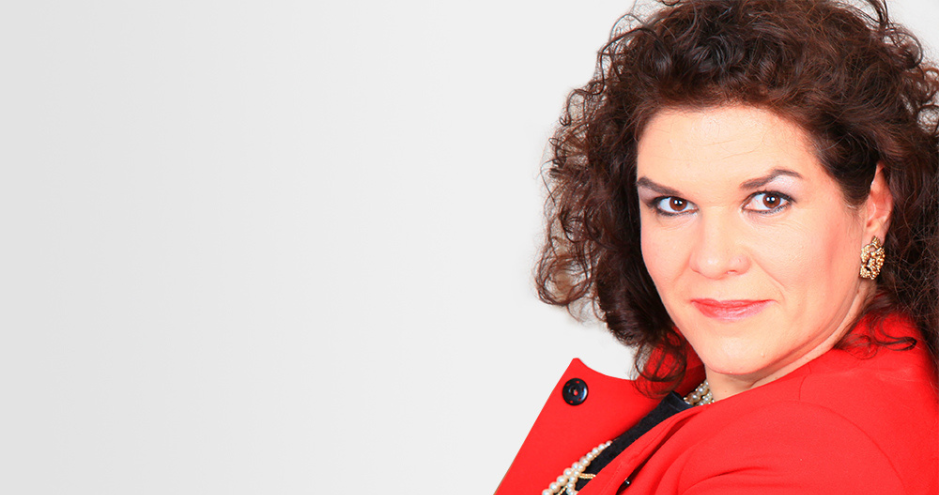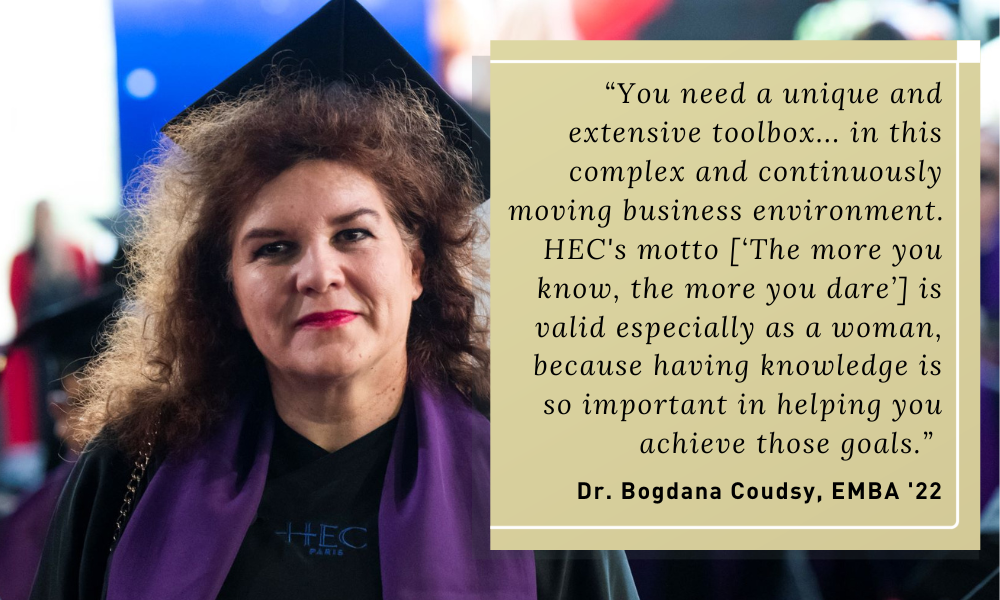Vaccine Strategy During the Week, EMBA on the Weekend: How this Medical Executive from Sanofi Pasteur Stays on Top
Dr. Bogdana Coudsy, Sanofi Pasteur’s Medical Head of Influenza franchise, is an expert in vaccines and immunology. She makes a daily population-level impact in the effort to stave off some of the world’s most complex public health scenarios. She’s also one of the faces in the proverbial crowd at HEC’s end-of-week modular EMBA courses.

Dr. Bogdana Coudsy, EMBA '22, is a handy person to have in your corner. A medical doctor by training and pharmaceutical marketer by trade, her résumé reads like a case study in stellar accomplishment in the fiercely competitive, male-dominated pharmaceutical industry. She’s held consequential posts at Johnson & Johnson, Procter & Gamble, and Sanofi-Pasteur. She is also a member of the HEC Paris Executive MBA English Modular class of 2022, and a mom.
Suffice it to say, she’s busy.
“Time is precious,” she says. “Time is money. I invest my time in this, and it’s absolutely worth it.”
She seems to have crafted a unique mastery of time as a resource. She made the time to obtain a Master’s in pharmaceutical marketing shortly after also having made the time to negotiate the bruising academic gauntlet of obtaining a medical degree. It would be reasonable to wonder how an EMBA, which represents yet another staggering time commitment, could benefit someone such a sterling academic and professional track record.
The EMBA difference
“I’m not even halfway through the program, but I’ve learned a lot,” she says, having started in September 2020 with the rest of the EM2022 autumn intake. “I feel like I become more intelligent just coming out of class. It’s amazing how much you can learn from our amazing professors – you’re constantly stimulated and so interested in the discussions and the course content that you feel like a sponge enriching yourself with knowledge. It’s a unique experience.”
“Time is precious; time is money. I invest my time in this, and it’s absolutely worth it.”
To Bogdana, much of uniqueness of that experience – in richness, depth, and insight – is in no small part due to the contributions made by the other outstanding individuals in her cohort. “My colleagues in the program are absolutely remarkable,” she says. “A lot of bright minds and dynamic personalities coming together in a unique learning community – we learn a lot from each other.”
Her day-to-day work often concerns “how to convince people to get vaccinated, and how to communicate on a population-level scale about the importance of preventing infectious diseases by vaccination.” Still, those bright and animated discussions in the classroom fuel her drive to continue.
Promoting growth
Bogdana reports that Sanofi-Pasteur, a company with an inarguably profound public health impact, stresses a culture of lifelong learning. As such, she has had the opportunity to connect new lessons and new responsibilities with fulfilling her own underpinning objective: making a difference. She thinks part of the reason she’s seen her work responsibilities grow is because the program gave her some of the tools necessary to land her current role.
“I think the opportunity that led to my new job was also due to the new perspectives given to me by the Executive MBA.”
“I think the opportunity that led to my new job was also due to the new perspectives given to me by the Executive MBA. Take its global outlook and holistic approach, for example; being able to discuss real-world business cases with colleagues from those countries able to explain the cultural nuances lends more weight to the learning experience. When I’m at work, I apply this true global vision that I get from class, and I use it every day.”
Already having waxed poetic about the bright perspectives afforded by her cohort-mates, Bogdana takes special care to mention a particular, professor-driven classroom experience that has had a profound impact on the way she approaches her newfound role.
“Jeremy Ghez and the metaphor of the Red Queen from Alice in Wonderland,” she says of a concept put forth for discussion by the HEC Associate Professor of Economics and Decision Sciences. “The story of the Red Queen from Alice in Wonderland demonstrates that in the business environment, no matter how successful an organization is, it’s imperative to keep moving forward to survive. There are changes that you must anticipate. Being able to separate the signals from the noise is about anticipation and agility of mind. Basically, do nothing and fall behind or run hard to stay where you are,” she says.
“You realize that changes happen so fast that you can’t just think about the next step – you have to think about the step after, too.”
Digital inoculation
Bogdana, the rest of the medical community, and for that matter all of us, saw the more unfortunate public health implications of this metaphor unfurl in 2020. To her, the promise of a mass-distributed, vaccine-colored light at the end of that deep, dark tunnel is a credit to the medical community’s flexibility in moving the bulk of the scientific communications infrastructure online.

“I can’t even imagine where we would be in this pandemic if we didn’t have the digital tools we do,” she explains.
“Lives have been saved because of the amount of digitization in the scientific community. The crisis caused and accelerated a lot of innovation because it was critical – it was critical to get support for the physicians to allow them to consult with patients stuck at home and it was critical to get new vaccines. The progress between the beginning of the crisis and now is amazing. Before, with the technologies available, it took an average of 8 to 10 years of research to find a vaccine now, within an extraordinary effort it was possible to obtain a vaccine in 18 to 24 months. I’m hoping we will benefit even more from that acceleration once this crisis ends, and that we’ll be able to maintain this innovation-driven, collaborative manner of working.”
Through the looking-glass
Part of her own pursuit of the elusive Red Queen, then, will surely rest in the digital realm. She’s set her sights on Leading the Digital Transformation as a Specialization for the next phase of her Executive MBA, and she’s bullish in her expectations.
“I think that the Executive MBA in general helps enhances people’s competences. It gives you a lot of self-confidence, which is important for a woman in a business environment. You need a unique and extensive toolbox to adapt to different situations in this complex and continuously moving environment. It has helped me aspire to executive-level positions than I’d otherwise believe to be out of reach. What HEC claims in its motto [‘The more you know, the more you dare’] is valid especially as a woman, because having knowledge is so important in helping you achieve those goals.”